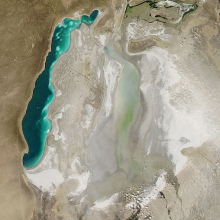
Salt pollution of freshwaters is increasing, negatively affecting human health and freshwater ecosystems, according to an article published in the February 26 issue of the journal Science. The study, conducted by an international team of scientists, reveals that human activities such as agriculture and the extraction of resources such as coal, minerals or gas, are increasing the total concentration of dissolved inorganic salts in freshwaters. Increased salinity levels of rivers and lakes could have a negative impact on freshwater biodiversity and alter important ecosystem functions, the scientists warned. Although the number of ecological disasters caused by increasing salinity so far is still low, they have brought about large-scale loss of biodiversity and suffering for people living in affected regions. The scientists name the fisheries collapse in the Aral Sea and the limited access to safe drinking water in the Ganges delta in Bangladesh as examples. In certain regions and countries, increasing salinity of aquifers and arable land have already made it impossible to cultivate certain crops, for example in the Ebro valley. According to the study, climate change will aggravate the problem because water evaporation will increase, diminishing the capacity of rivers and lakes to dilute salts. In addition, rising sea levels will cause salt water to invade fresh water in coastal areas. In regions where food production and the provision of drinking water will become increasingly difficult, salinity may also lead to migration. Salinity can also have adverse effects on human health and lead to higher costs of water treatment for human consumption. The authors criticise that current standards to measure salinity focus solely on human uses of water, ignoring the protection of aquatic biodiversity. “In most cases these are only recommendations (not legally binding) based on the total quantity of salt (i.e. salinity), without taking into account the concentration of different ions (e.g. chloride, magnesium, sulfate, sodium, etc.),” said lead author Miguel Cañedo-Argüelles from the University of Vic and the University of Barcelona. Since different ions have different toxicity, these regulations do not adequately assess the toxicity of saline water to aquatic organisms, the researchers said. Some countries, like Australia and the United States, have made progress in regulating permitted salinity levels on the basis of ecological criteria, the scientists said, but the degree of protection is still insufficient. The authors argue that salinity standards for specific ions and ion mixtures, not just for total salinity, should be developed and legally enforced to protect freshwater life and ecosystem services. They also present measures and good practices to reduce salt concentrations in freshwaters. The recommendations include better water use for agricultural practices, less salt for road de-icing, less discharge or sequestering salts during mining operations, and stricter permits and controls for enterprises that discharge salt-rich effluents into rivers and lakes. (ab)
